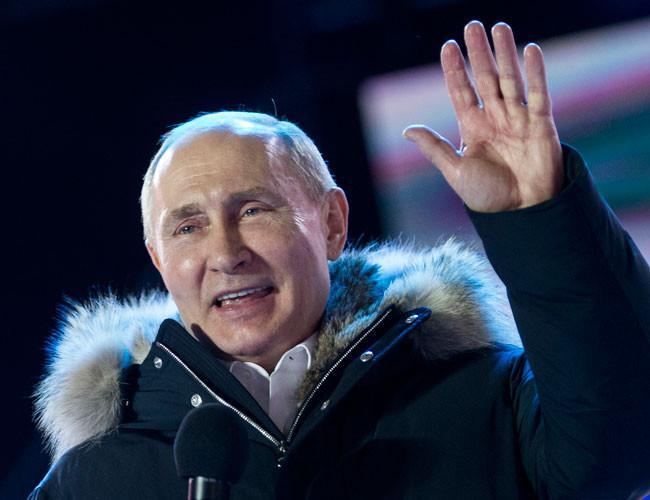
Russian President Vladimir Putin won a landslide re-election victory on March 18, extending his rule over the world’s largest country for another six years at a time when his ties with the West are on a hostile trajectory.
Putin’s victory will take his political dominance of Russia to nearly a quarter of a century, until 2024, by which time he will be 71. Only Soviet dictator Josef Stalin ruled for longer in Russia. Putin has promised to use his new term to beef up Russia’s defences against the West and to raise living standards.
In a widely expected outcome, the Central Election Commission, with just over 70 percent of the votes counted, announced that Putin, who has dominated the political landscape for the last 18 years, had won 75.9 percent of the vote.
In a victory speech near Red Square, Putin told a cheering crowd he interpreted the win as a vote of confidence in what he had achieved in tough conditions.
“It’s very important to maintain this unity. We will think about the future of our great Motherland,” said Putin, before leading the crowd in repeated chants of “Russia!”
He told a meeting of supporters afterwards that difficult times were ahead, but that Russia had a chance to make “a breakthrough.”
No surprise
Backed by state TV, the ruling party, and credited with an approval rating around 80 percent, his victory was never in doubt. His nearest challenger, Communist Party candidate Pavel Grudinin, got around 13 percent, according to partial results, while nationalist Vladimir Zhirinovsky got around 6 percent. None of the seven candidates who ran against Putin posed a threat, and opposition leader Alexei Navalny was barred from running.
Critics alleged that officials had compelled people to come to the polls to ensure that voter boredom at the one-sided contest did not lead to a low turnout. Turnout figures will be closely scrutinised. Early signs suggested turnout would exceed 60 percent.
Russia’s Central Election Commission recognised that there were some irregularities, but was likely to dismiss wider criticism and declare the overall result legitimate.
Hostile relations
Putin’s bellicose language reached a crescendo before the election in a state-of-the-nation speech when he unveiled new nuclear weapons, saying they could hit almost any point in the world and evade a U.S.-built missile shield.
At odds with the West over Syria, Ukraine, allegations of Russian election meddling and cyber attacks and the poisoning in Britain of a former Russian spy and his daughter, relations between Moscow and the West are at a post Cold War low.
Putin, 65, has been in power, either as president or prime minister, since 2000.
Allies laud the former KGB agent as a father-of-the-nation figure who has restored national pride and expanded Moscow’s global clout with interventions in Syria and Ukraine.
Critics accuse him of overseeing a corrupt, authoritarian system and of illegally annexing Ukraine’s Crimea in 2014, a move that isolated Russia internationally.
Western sanctions on Russia imposed over Crimea and Moscow’s backing of a pro-Russian separatist uprising in eastern Ukraine remain in place and have damaged the Russian economy, which only rebounded last year after a prolonged downturn.
Britain and Russia are also locked in a diplomatic dispute over the spy poisoning incident, and Washington is eyeing new sanctions on Moscow over allegations it interfered in the 2016 U.S. presidential election, something Russia flatly denies.
Putin said on Sunday it was nonsense to think that Moscow would have poisoned former Russian spy Sergei Skripal and his daughter in Britain and said Moscow was ready to cooperate with London.
Officials and analysts say there is little agreement among Putin’s top policymakers on an economic strategy for his new term.
How long Putin wants to stay in power is uncertain. The constitution limits the president to two successive terms, obliging him to step down at the end of his new mandate -- as he did in 2008 after serving two four-year terms. The presidential term was extended from four to six years, starting in 2012.
Asked after his re-election if he would run for yet another term in office, Putin laughed off the idea.
“Let’s count. What, do you think I will sit (in power) until I’m 100 years old,” he said, calling the question “funny.”